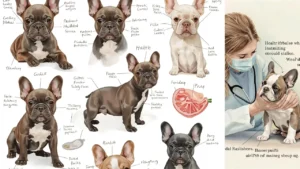French Bulldog puppies are among the most endearing and favorite types of dog breeds in contemporary times. They have a small size, adorable personality and unique appearance that many pet lovers look up to. In case you want to find a low-maintenance and affectionate pet, then a French Bulldog puppy is the pet you are seeking.
So Why are French Bulldogs Puppies Special?

French Bulldog puppies are little muscular dogs having the smoother fur coat, short nose, and ears making them look like a bat. They are good natured and will suit families, single people as well as elderly people. They can also be used in apartments due to the quiet nature.
The puppies of French bulldogs do not bark at all in comparison to other dogs. Nevertheless, they are attentive and watch out perfectly. They are very easy-going in their playful manner but they can be used at any ages.
Look and Dimension of French Bulldog Puppies

Following the purchase of French Bulldog puppies you will realize that they have a distinctive body structure. They have:
- a well-built, not-so-large body
- wrinkled skin and a flat face
Sticking out ears Many describe the child as having prominent ears that stick out.
A heavy coat well trimmed and silky Short hair that is important to cover the squareish countenance Lastly, not forgetting the eyes which are the medium of the exchanges
French Bulldog puppies are on average 16 to 28 pounds and can grow up to 11 to 12 inches tall. They are perfect in indoor living because of these measurements.
Temperament and Personality

French Bulldog puppies Health tips, the popularity of French Bulldog puppies is also dictated by the personality of the animal. They are:
- Affectionate
- Playful
- Intelligent
- Loyal
The French Bulldogs are sociable dogs. They love human contact and can easily get separation anxiety when not left in the company of people. To avoid this ensure that you pay them a lot of attention and care each day.
Common Problems and Health

The puppies of French Bulldogs are not actually unhealthy but still, as any other breed, they have their breed related issues:
- Brachycephalic Syndrome: Due to the short nose of puppies of French Bulldogs with which they have breathing difficulties, they can have the symptoms of the Brachycephalic Syndrome.
- Skin Allergies: Dirt may end up being trapped in their crevices and lead to irritation.
- Hip Dysplasia: With most of the small breeds, joint problems are prone to occur as they get old.
A French bulldog puppy can be taken care of with frequent visits to the veterinarian center and proper care.
Care and Grooming

A good grooming maintains a French Bulldog puppy in the best The best appearance. Here is how you must go about it:
- In order to get rid of spare coat, brush their coat at least once a week.
- Wash their wrinkles on the face in order to prevent infections.
- Clipping of nails every month.
- use soft dog shampoo not more than once in a week. Moreover, the puppies of French bulldogs are sensitive to overheating and hence they should be kept in cool conditions especially during the summer.
Feeding French Bulldog Dogs

Health Tips for French Bulldog Puppies require healthy nutrition. Feed them:
- Good puppy food that is rich in proteins and has healthy fats.
- Two or three little meals a day
- Availability of fresh water at any moment available on demand.
- Do not overfeed because French Bulldog puppies might acquire weight problem easily, which aggravates breathing problems.
Socialization and Training
The French Bulldog puppies are very easy to train since they are well smart and want to please. Use:
- Positive reinforcement
- Small, regular training session
- Lots off acclaim and goodies
Socialization at a tender age should also be important. Expose them to new faces, new animals/stray animals and new places. This makes them become well-behaved adult dogs.
The Reason to Pick French Bulldog Puppies.

It is once again the question why to own French Bulldog puppies? Here’s why:
- They have low energy, and they do not require lots of exercise
- Perfect in small houses or flats
- Do not whine Do not bark too much
- Simple clean up
Loving and excellent with children

The point is that French Bulldog puppies are the best combination of adorableness, relaxation and adherence. The baby dogs of French Bulldogs are light hearted and faithful to burst out in love. Whether you’re a new dog owner or an experienced one, these little bundles of joy are sure to make your home warmer and your heart fuller.
Well taken care of, trained and loved, the French Bulldogs puppies will give you years of their loyalty.
Frequently Ask Questions
1. What is the best diet for a French Bulldog puppy?
A balanced diet with high-quality puppy food rich in protein, healthy fats, and essential vitamins is ideal. Avoid foods with artificial fillers or too many grains. Always consult your vet for portion sizes.
2. How often should I take my French Bulldog puppy to the vet?
Puppies should have checkups every 3–4 weeks until they are 16 weeks old for vaccinations and growth tracking. After that, schedule regular visits every 6–12 months.
3. How can I prevent breathing problems in my French Bulldog?
Keep them cool, avoid overexertion, and maintain a healthy weight. Frenchies are prone to brachycephalic airway syndrome, so avoid walks in extreme heat or long play sessions.
4. What’s the best way to keep my Frenchie’s skin healthy?
Clean their skin folds regularly with a damp cloth to prevent infections. Use a gentle, vet-approved shampoo and dry their wrinkles carefully after baths.
5. How much exercise does a French Bulldog puppy need?
About 15–30 minutes of light activity daily is enough. Short walks and indoor playtime help them stay fit without straining their breathing.
6. How can I support my French Bulldog’s joint health?
Avoid letting them jump off high surfaces and provide joint-supporting supplements if recommended by your vet. Maintaining a healthy weight also protects their bones and joints.
7. Are French Bulldog puppies prone to allergies?
Yes, they can have food and environmental allergies. Watch for signs like itching, red skin, or ear infections, and talk to your vet about hypoallergenic diets or treatments.







